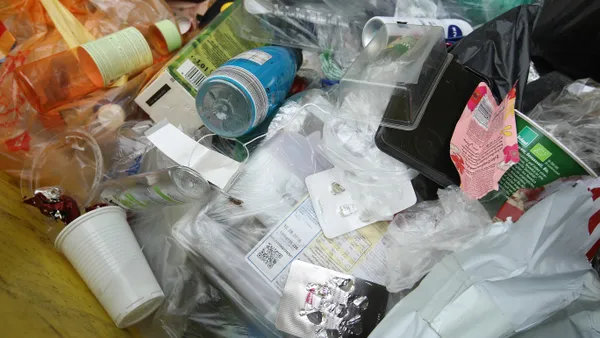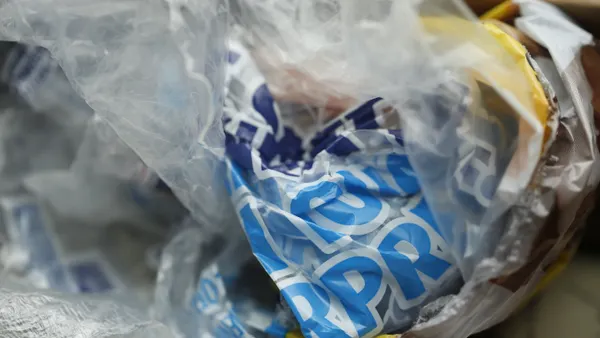Dive Brief:
- About a quarter of respondents (26%) in a recent survey of 2,000 adults by the Grocery Manufacturers Association (GMA) feel recycling is more difficult than assembling IKEA furniture. Another 23% find recycling more complicated than completing a tax return, and 22% find it more complex than the stock market.
- The report concludes, somewhat surprisingly, that "the more environmentally concerned the respondent, the greater likelihood they will be aspirational recyclers." On top of that, when categorized by age, millennials were found to be the age group most guilty of "wishcycling."
- That tendency was demonstrated by more than half of respondents identifying several typically undesirable packaging items as being acceptable in a typical recycling program. The most frequently-identified objects were plastic bags (60%), single-use coffee cups (55%) and plastic straws (53%).
Dive Insight:
GMA represents more than 200 companies in the consumer packaged goods (CPG) industry, including manufacturers, retailers and marketers of supermarket products. The "Reduce, Reuse, Confuse" report praises the efforts undertaken by companies in the CPG industry, including commitments to increase the quantity of recycled materials used in manufacturing. More than 150 companies have now signed onto the New Plastics Economy Global Commitment, 120-plus are utilizing the How2Recycle label and dozens of major brands are participating in the new Loop reusable container program.
Numerous CPG companies have also pledged to collaborate on furthering a circular economy for plastics — part of a broader shift in corporate responsibility. This could also be partially due to the negative consumer attention many have received for their perceived lack of effort or participation in the waste conversation. The report urges consumers and public and private stakeholders alike to work collaboratively to fix recycling and achieve environmental benchmarks, suggesting that readers "package with the planet in mind."
According to the report, only about 38% of U.S. residents were significantly conscious of environmental issues a decade ago. That percentage jumped to 51% five years ago, and today it stands at 74%. This is reflected in consumer purchasing habits, with 26% of U.S. residents regularly buying products deemed "environmentally responsible" and only 8% stating they never have and likely never will knowingly buy such products.
The report's underlying message is that the general practice of recycling is too complicated and a failure in its current form — only 4% of survey respondents say they aren't confused by recycling. The study hits on several trending topics contributing to this perspective, including attention around plastic straw use, China's scrap import restrictions, contamination caused by single-stream collection and unclear messaging.
The misunderstanding between consumers and manufacturers on the intent of resin codes and low identification among respondents of four recycling icons – ranging from the standard Möbius loop to the more obscure glass recycling symbol – were highlighted as representative of the need for improved communication.
Deficient policies and the wide variation among community recycling programs are also cited as contributing factors in the national system's current inefficiency. According to the survey, 74% of respondents assert that "more standardized rules at the national or state level would bring more clarity to recycling." A seemingly innocuous solution, this would be difficult to implement: many states and communities have varying targets related to waste that their neighbors have not even begun to address.
While interest in regional market development for commodities has grown recently, the current system of recycling has had geographic gaps in supply, manufacturing and consumption for decades. Processors of recyclable materials routinely ship commodities internationally, as manufacturers in the U.S. are not interested in purchasing their feedstocks. In order to make uniformity possible, the disconnect of the current take-make-dispose system of goods would potentially require significant economic stimulus in order to bring the cycle of goods to a regional level.









